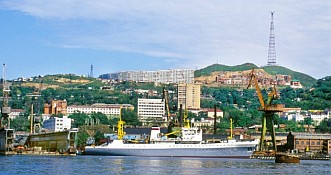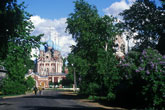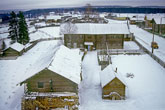Gentry idyll on the Sheksna River
Photographs by William Brumfield
Readers of the Russian classics, from Pushkin to Turgenev and Tolstoy, know that the country estate was a special cultural and social environment. Despite the problems of Russia's social and economic system in the countryside, the estate possessed an enchanted ambiance – at least in the literary imagination.
The revolutionary cataclysm following 1917 destroyed most of the estates and dispersed the nobility. The fraction of estate houses that remained were converted to a variety of uses, usually with poor maintenance. And yet there have been some remarkably successful examples of preservation and restoration.
None is more unexpected than the Galskoy estate of Gorka ("little hill"), located on the sloping left bank of the Sheksna River opposite Cherepovets in the western part of Vologda Region. Known for the giant Severstal steel plant and other industrial behemoths, Cherepovets (population 316,000) seems far removed from the typical image of the gentry estate.
But in the mid-19th century, when the Galskoy family came into possession of the estate, Cherepovets was a modest town of only a few thousand inhabitants on the Sheksna.
The Gorka estate house is itself a curiosity, imposingly designed in the early 1830s in a neoclassical style befitting a brick mansion. In fact only the shallow foundation is brick, while the house itself is constructed of stout logs surfaced in painted plank siding.
How to get there
To get to the Galskoy estate of Gorka take the regular train from Moscow to Cherepovets(departure from Yaroslavsky railway station: 09:05 p.m., travel time 11:20), than take a local bus to Maturunskaya st., 29.
The interior walls of the main rooms were plastered and covered with wallpaper. Thus, the structure combined the warmth of wood with the appearance of a grand masonry residence.
The original owner of the house was Andrei Kudryavy (1792-48), who achieved noble status and the rank of colonel for his military service, which included the War of 1812. His daughter Alexandra – one of five children – married Lev Galskoy (1814-75), of a noble family known in the area since the early 18th century.
In 1856, Alexandra inherited the Gorka estate, thus linking it to the Galskoy family. Lev and Alexandra had four children, including three sons.
The Gorka estate prospered, and in 1896 it passed into the hands of the third son, Nicholas (1855-1920). He and his wife Maria had four children – two sons who died in infancy and two daughters. A frequent guest at the estate was Nicholas's sister Maria Yanish, who had five sons, all of whom entered military service.
Although life on the estate maintained its tranquility in 1914, the clouds of war touched the Galskoy clan. One of Maria Yanish's sons had already perished as a test pilot in 1912. The disastrous campaigns on the eastern front undermined the Romanov dynasty, which had just celebrated its tercentenary in 1913. Nicholas II abdicated the throne on March 2 (15), 1917.
The four years of civil war that followed the Bolshevik seizure of power in Petrograd on November 7, 1917 fundamentally altered Russia's economic and social situation. In a story repeated throughout the country, the Galskoy family was driven from its estate and reduced to penury.
Nicholas, the father, died in 1920. Of the two daughters, Anastasia (1904-67) resorted to menial labor to support her ailing mother and her small sister Maria (1914-92).
In 1930, Maria Galskaya was arrested and sent with her younger daughter, Maria, to the distant Siberian town of Yeniseisk. After her mother's death, in 1933, Maria made her way back to her sister Anastasia, then living in Leningrad.
Other family tragedies ensued, but fortunately, both daughters and their progeny survived the war. In 1956, the daughters achieved the formal rehabilitation of their mother, an admission that she, like so many others, had been unjustly arrested. Descendants of the family now live in St. Petersburg and Moscow.
And the estate house has survived. During the Soviet period its various uses included an agricultural school, a dormitory, and a state farm named "Red Gorka." In 1960, the house – still housing farm workers – gained landmark status.
In 1989 the Gorka estate territory was declared a historical museum, and the process of restoration slowly began. Twenty years later, in 2009, the house opened to visitors, even as the restoration of rooms continued. Descendants of the Galskoy family have donated original items to the superb restoration effort.
Visitors to the house today enter the slightly elevated ground floor of the house, which originally included vestibules, living and dining rooms, rooms for servants, a wine cellar and perhaps a kitchen. (Many country houses in Russia had the kitchen in a separate nearby structure.) A number of these rooms have been carefully restored.
The upper floor has higher ceilings and contained the main rooms for the family, including the master bedroom, separate studies for husband and wife, a library and children's room. A large living room overlooked the portico on one façade of the house, and a ballroom occupied the center of the other side.
Above the main floor is a spacious attic that was sparsely outfitted for family use, particularly in the summer.
A few service buildings have been preserved on the territory, including an interesting two-story barn with an exterior gallery. The estate-museum also has a functioning stable, popular with local families.
Although less well known than other Russian estates, associated with prominent literary and cultural figures, the former Galskoy estate at Gorka is one of the most attractive restoration efforts in Russian today. Its informed staff welcomes visitors.
All rights reserved by Rossiyskaya Gazeta.
Subscribe
to our newsletter!
Get the week's best stories straight to your inbox


